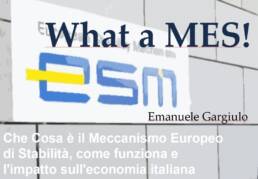The dangers of the ESM revealed at a conference in Switzerland
In Uster, economist Emanuele Gargiulo, moderated by Andrea Schenone of “Swiss Federalism”, illustrated the too many flaws of the European Stability Mechanism
On Friday, December 20, 2019, the association “Swiss Federalism” held in Uster, in the Canton of Zurich, a conference on the ESM, the so-called “rescue fund”,

elaborated within the framework of the European Union and with legal headquarters in the Grand Duchy of Luxembourg.
Under the moderation of the president of the new association of Swiss law, which aims to promote the positive peculiarities of federalism and of the economic and political system of the Swiss Confederation at international level, the financial analyst Andrea Schenone from Sangallo, an exceptional guest spoke.
Emanuele Gargiulo, economist of an important financial institution operating in the city on the Limmat, presented the slides of his own work on the subject, telling about the European Stability Mechanism in a new perspective.
Those twists and turns of Italian parliamentarians
In the Canton of Zurich, the great political “confusion” on the issue was explained, in particular of those members of parliament of the Italian Republic, deputies and senators, who in the space of a few months have radically changed their minds on the issue (first considered a “terrible risk to avoid” and then “an insurance on the

life”), as well as its genesis, its historical background and its legal and administrative structure.
The director of the ESM today is Klaus Regling, born in 1950, native of Lübeck, former Minister of Economics of the Federal Republic of Germany, appointed in 2012.
The members of the European Stability Mechanism enjoy immunity and inviolability of acts, but not only that: the ESM is nothing more than a simple “limited company” of capital, subject to the Luxembourg law on commercial companies of August 10, 1915.
The mechanism would clearly seem to severely penalize Italy in the event of its use and to meet above all the need to protect the interests of Germany.
It seems to be the umpteenth piece in the “genuflection” to Berlin of successive governments at Palazzo Chigi, from Mario Monti onwards, cabinets expression

not of a clear popular will, but of palace “inciuci”, even between minority parties…






